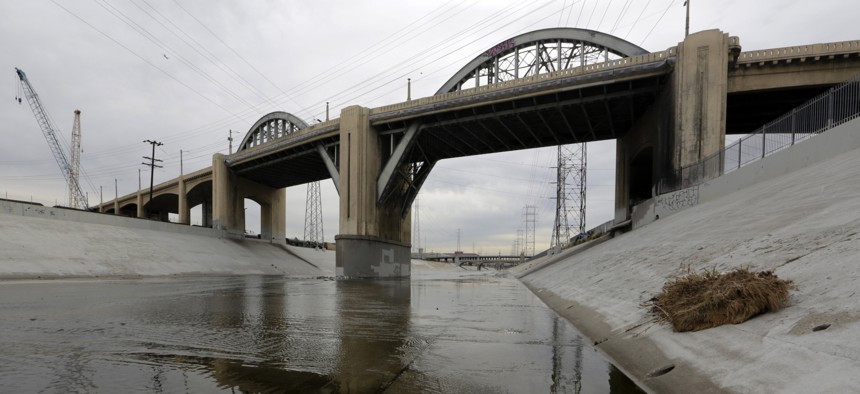Cities Delay Infrastructure Projects Amid Covid-19 Budget Uncertainty

The 6th Street Bridge spans over the Los Angeles River Wednesday, Jan. 27, 2016, in Los Angeles, before it is closed permanently for demolition. The landmark bridge, dating to the 1930s, is being replaced due to deterioration. AP Photo/Damian Dovarganes
A survey by the National League of Cities Found that more than 700 cities are cancelling or delaying infrastructure projects because of budget shortfalls caused by the pandemic.
Cities and towns across the United States are cutting budgets as the result of financial pressure brought on by the coronavirus pandemic—and that’s translating to fewer infrastructure projects, a new survey has found.
Of 1,100 municipalities asked about local spending cuts, 65% said they are either canceling or delaying infrastructure projects or capital expenditures, according to the survey conducted by the National League of Cities.
Those cuts have the potential to stifle economic recovery efforts by reducing job growth, said Joe Buscaino, NLC president and president pro tempore of the Los Angeles City Council.
“Cancelation will create an economic ripple effect,” he said on a phone call Thursday to discuss the survey’s results.
In Los Angeles, one capital project at risk of being delayed is a revitalization of the Hollywood Walk of Fame that would reduce road traffic and expand sidewalks. Buscaino said it was planned to help boost tourism. Another potentially delayed project would include redevelopment around the Los Angeles River, which Buscaino said would include housing and more walkable, bikeable trails.
The NLC is pushing for Congress to provide direct federal funding to cities and towns so they will be able to use the money to address local needs as they emerge from the coronavirus crisis. The CARES Act that Congress passed earlier this year allocated $139 billion in state and local government aid, but money only went directly to state governments and cities with populations over 500,000 people. There are also restrictions on how the money can be spent, so governments can’t use it to make up for lost tax revenue.
In addition to infrastructure delays, the NLC survey found that 61% of cities are delaying or canceling equipment purchases, decisions the group warns will stunt commercial activity among local businesses that provide equipment for municipal projects.
As a result of expected budget cuts in Lexington, South Carolina, capital expenditures including the purchase of new police cars will not be funded this year, said Councilmember and NLC First Vice President Kathy Maness.
“Our police department needs police cars that we cannot fund,” she said.
The NLC survey found that 74% of municipalities in the United States have already started making cuts in response to expected revenue losses, with 20% of cities saying cuts were being made across the board, hitting all of their agencies and departments.
The NLC survey also highlights other budget cuts that could have negative effects on cities’ ability to recover economically. About 24% of cities said without more support they will cut community and economic development programs, and 13% said they will cut code inspection, planning and permitting budgets.
There has been some forward momentum in Congress to provide infrastructure funding as a means to stimulate the economy.
House Democrats rolled out a $1.5 trillion infrastructure package earlier this month that would spur construction projects such as roads and bridges, but also go beyond transit projects and include investments in affordable housing, broadband, schools and green energy initiatives. But Republicans in the House and Senate have expressed skepticism about moving forward with large spending packages and been critical of some of green spending priorities included in the House bill.
Democrats in the House in May passed legislation directly aimed at economic stimulus and providing aid related to the coronavirus and economic downturn, including $1 trillion in proposed aid for state and local governments.
But Senate Republicans have said the $3 trillion package is too expensive, suggesting they will only back a more limited bill. On Friday, Senate Majority Leader Mitch McConnell said the Senate will take up the issue of a new aid package in July, but would also focus on measures to limit liability for companies related to the coronavirus—a provision Democrats have rejected.
Andrea Noble is a staff correspondent with Route Fifty.
NEXT STORY: The Second Great Depression





